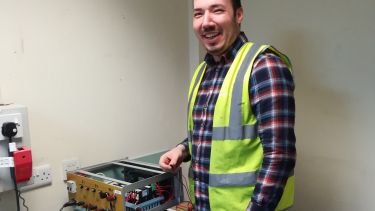Driving product innovation within SMEs: The University of Sheffield and Evolution Power Tools
A Knowledge Transfer Partnership (KTP) between the University of Sheffield and Evolution Power Tools has enabled the company to innovate its product lines and also helped the University validate academic theories against real-world industry problems.

A Knowledge Transfer Partnership (KTP) between the University of Sheffield and Evolution Power Tools has enabled the company to innovate its product lines and also helped the University validate academic theories against real-world industry problems.
By working together through the KTP, the collaborative team gained a better understanding of the global motor supply chain, devising a more compact motor configuration with the same power output. The KTP has also provided both parties with the foundation to apply for grants to enable future collaborations.
Maintaining a competitive edge
Evolution Power Tools is a Sheffield-based business founded in 1992. It Specialises in the manufacture of power tools for professional tradespeople (using multi-material cutting technology) as well as for home DIY projects, as Lee Price, an industrial designer at the company explains.
We’ve made a name for ourselves producing products that safely and effectively cut different materials – from steel to lumber – without the need to change blades. We punch well above our weight compared with the market giants such as DeWalt, Makita and Black & Decker. That’s partly because we’re agile and we put a focus on innovation and technology. But to stay ahead of the curve, you have to keep innovating and that’s where our links with academia, particularly the University of Sheffield, prove essential.
Lee Price
Industrial Designer, Evolution Power Tools
Mastering motor technology
Lee and his industrial design team at Evolution initiated a technology exploration project and considered different options including internet connectivity and software for their products. In the end, they chose to focus on the motors. Since every product they sell contains one it made the most sense to master the engineering and science of motor technology.
So Evolution reached out to the University of Sheffield’s Department of Electronic and Electrical Engineering and its Electrical Machines and Drives (EMD) Group which has an outstanding track record for innovation and commercialisation in various sectors – from automotive and aerospace through to consumer products.
The EMD group were able to plan a KTP project and recruit an excellent KTP Associate with unrivalled expertise in this area – Dr Petrica Taras, who completed a PhD in motor physics within the EMD group in 2018.
As part of the KTP Lee and Petrica then undertook a couple of discrete but interrelated projects on different aspects of motors.
“Everybody has a finite skillset; I’ve spent some time absorbing technology and methods and developing interesting ideas in electric motors. But there’s only so far you can go without having specific engineering expertise and deep background in that kind of technology as Petrica does,” Lee says.
In the first instance, they looked more closely at the supply chains involved in the motors they use in their products – which vary greatly in size and configuration, depending on what region and voltage they are specified to and what factory they are produced in. This makes sourcing spare parts a particular challenge. Through this process they were able to cluster suppliers, harmonize the overall supply chain and arrive at a more ‘cohesive product’.
Achieving performance gains
Armed with this greater knowledge of the motors that go into their own products, they were then able to think in detail about ways to improve them. They brought in specialist test equipment to analyse various motor components and ran simulations and modelling, looking for opportunities to make gains. Lee and Petrica even travelled to China together to observe motors being assembled in a factory and construct their own variants.
Through this process they arrived at a new motor design with a novel configuration, which is more compact, achieving volume savings of up to 40% – while maintaining the same power output. This has the potential to make tools much lighter and also cheaper, therefore, very attractive for next-generation power tools. Using computational fluid dynamics (CFD) analysis they were also able to achieve cooling and airflow improvements – which is critical since temperature handling is key to the lifetime of a motor.
“What’s amazing is that over the course of the project we were able to make enough discoveries to actually gain major improvements in a field that has been ploughed so many times before,” says Lee.
Leveraging academic-business synergies
For both Evolution Power Tools and the University of Sheffield, there were major mutual benefits in the overall KTP project. Reflecting on the experience, Lee says:
It’s a lot of risk and investment to hire for a new permanent role, so the KTP is a great way to open doors and give access to this incredible scientific knowledge and the connections that come from that to really boost the level of in-house knowledge in your company. We’ve massively levelled up our knowledge and understanding about motors in a way that was affordable for the business and allowed us to compete at a higher level.
Lee Price
Industrial Designer, Evolution Power Tools
For the Department of Electronic and Electrical Engineering at the University of Sheffield, the KTP project provided an excellent opportunity to test academic theories.
Dr Guang-Jin Li, Senior Lecturer in Electrical Machines in the EMDgroup, the Principal Investigator of the KTP project, said:
As a Department and a research group, we pride ourselves on our ability to understand and respond to the most pressing real-world problems in various industry sectors. The KTP is an excellent way of identifying and focusing on particular areas and helps in defining specific outputs. As in this case, with Evolution Power Tools, it can also lead to avenues to extend collaborations further.
Dr Guang-Jin Li
Senior Lecturer in Electrical Machines in the EDM group
Indeed, by strengthening the relationship between Evolution and the University, the project has also provided the foundation to apply for a joint Engineering and Physical Sciences Research Council (EPSRC) project.
Together, Evolution and the University have been preparing for two new patent applications based on the motor developments that came out of the KTP and plan to publish their research.
For more information on Knowledge Transfer Partnerships contact Eleanor Edey, Regional Partnerships Development Officer (e.edey@sheffield.ac.uk).


